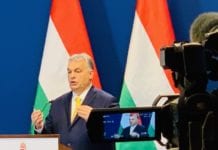By Stefan J. Bos, Chief International Correspondent BosNewsLife

SKOPJE/BUDAPEST (BosNewsLife)– Macedonia held presidential and local elections Sunday, March 22, seen as vital to the country’s plans to join the European Union and NATO.
Final results were expected to be made public on Monday, March 23, but the international community already warned Macedonia that its chances of joining these two organizations could be jeopardized by electoral fraud or violence, while advocacy groups also urged the country to improve religious rights.
Ahead of Sunday’s ballot, a camera only showed women’s legs walking on high heels disappearing in the crowd, while an announcer encouraged women to vote “independently” in the presidential and local elections Sunday in the former Yugoslav republic of Macedonia.
This television commercial was made by the Organization for Security and Cooperation in Europe to discourage “family voting” in which women are pressured by husbands or others on how to vote on a certain candidate.
The OSCE said family voting is one of several irregularities observed during the 2008 parliamentary elections. OSCE and other observers have also expressed concerns over violence and fraud.
POLICE PATROLS
Police patrols were reinforced in regions where incidents occurred in previous polls, including in ethnic Albanian areas, where last June one person was killed and several others wounded in gun battles.
Analyst and reporter of the respected Christian Science Monitor publication, Robert Marquand, says Sunday’s ballot is crucial for Macedonia’s attempts to join organizations such as the European Union.
“Presidential elections are not as important as the elections for prime minister, which were last year,” said Marquand. “But it is an important election in the sense that they need to be free, fair and non violent in order for Macedonia to qualify for certain EU accession [and] membership qualifications.”
Nearly two million eligible voters could choose a new president with a five-year mandate, as well as mayors and councilors of major towns.
Leading in opinion polls among the presidential candidates was George Ivanov from the ruling conservative VMRO-DPMNE party of Prime Minister Nikola Gruevski.
Polls showed that the main opposition Social Democratic Union party’s candidate, Ljubomir Frckoski, was lagging far behind.
ALBANIAN ‘OBAMA’
He was also expected to face a strong challenge from a candidate representing Macedonia’s ethnic-Albanian minority, Imer Selmani, who has been nicknamed the Macedonian Obama after the United States president.
As none of the candidates were likely to receive an outright majority, a run-off ballot was expected between the two remaining top contenders on April 5.
Presidential candidate Ivanov has told his supporters he wants to help overcome nationalistic divisions in Macedonia, which narrowly averted civil war in 2001, following a peace deal between ethnic-Albanian fighters and Macedonian security forces.
He told his supporters that “the seed of divisions was planted centuries ago” as “our grandfathers were divided for instance to Greeks, Bulgarians, Serbs, and our fathers to communists” and ruling party members. But he added that this “is no longer the spirit of the new generation” of this young nation.
Analysts say however that religious and nationalistic tensions remain high as Macedonia has been struggling to find its own identity since becoming an independent nation in 1991, following the break up of Yugoslavia.
RELIGIOUS DISCRIMINATION
In addition, “state discrimination in favour of one religious confession – the Macedonian Orthodox Church – is a dominant factor,” said rights group Forum 18 in a recent survey on the situation in the Balkan nation. “The main target for state officials is the Serbian Orthodox Church, but smaller confessions such as Baptists, Bektashi Muslims, Hare Krishna devotees and Jehovah’s Witnesses are also discriminated against.”
To build, expand or obtain buildings for worship remains difficult due to “unclear and discriminatory legal provisions” in a Religion Law, Forum 18 said.
Amid soul searching in the country, Macedonia also face another problem with neighboring Greece which refuses to recognize the name Macedonia and has therefore blocked the country’s attempt to join NATO.
Analyst Marquand said Macedonia has further angered Greece by naming a main roadway and, earlier, the national airport after the ancient conqueror Alexander the Great.
“Now they are going full [blown] and claim this Alexander heritage and galvanize people around it,” he said. “On the other hand a former foreign minister I spoke with said one of the problems is that there is an identity crisis. There is a problem in a neighborhood like the Balkans, they have always had an issue with trying to express a strong identity and they are still just emerging.”
Whatever the outcome of Sunday’s ballot, observers have warned that nationalist tensions are expected to remain in the region for some time to come. (Parts of this BosNewsLife News story also airs via its affiliate Voice of America (VOA) network. www.voanews.com).








